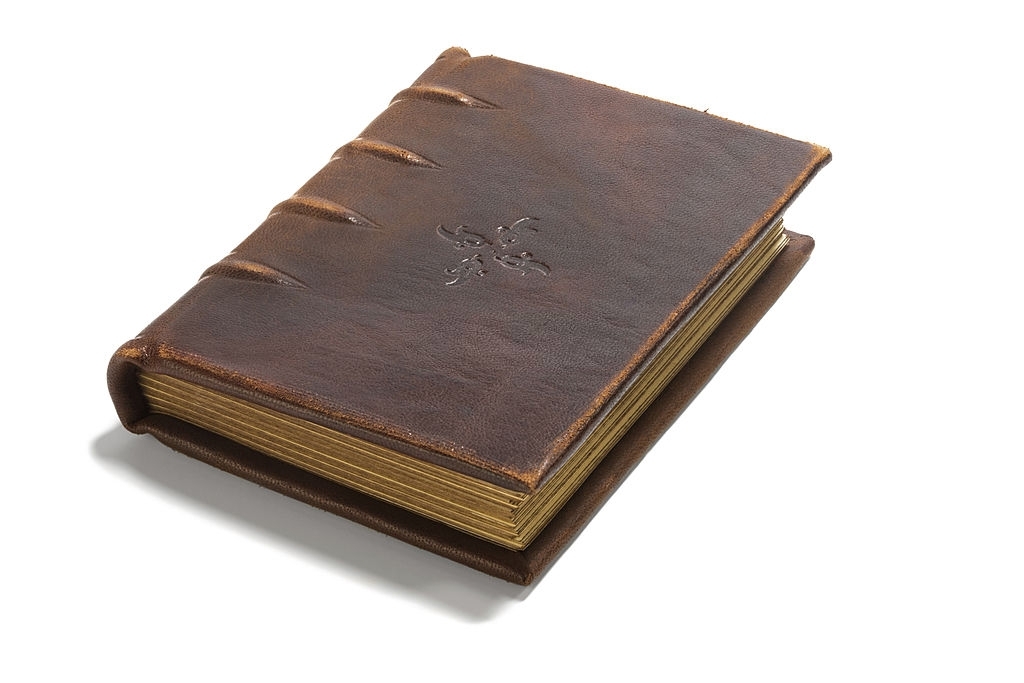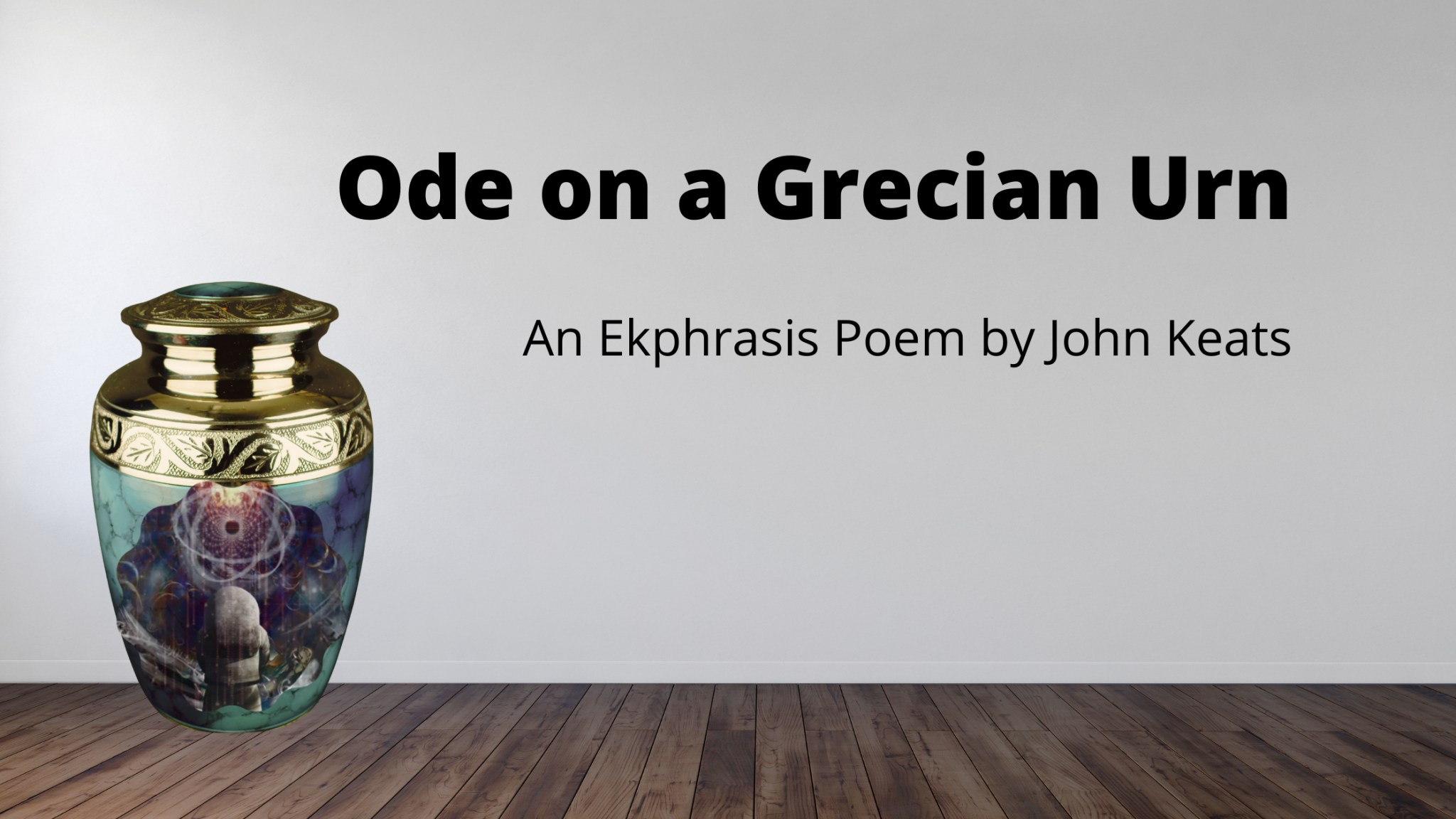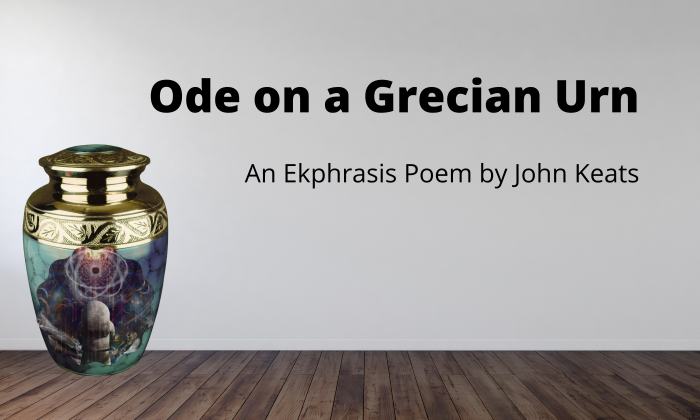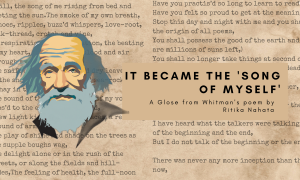Ode On Greacian Urn – The Poem
Thou still unravish’d bride of quietness,
Thou foster-child of silence and slow time,
Sylvan historian, who canst thus express
A flowery tale more sweetly than our rhyme:
What leaf-fring’d legend haunts about thy shape
Of deities or mortals, or of both,
In Tempe or the dales of Arcady?
What men or gods are these? What maidens loth?
What mad pursuit? What struggle to escape?
What pipes and timbrels? What wild ecstasy?
Heard melodies are sweet, but those unheard
Are sweeter; therefore, ye soft pipes, play on;
Not to the sensual ear, but, more endear’d,
Pipe to the spirit ditties of no tone:
Fair youth, beneath the trees, thou canst not leave
Thy song, nor ever can those trees be bare;
Bold Lover, never, never canst thou kiss,
Though winning near the goal yet, do not grieve;
She cannot fade, though thou hast not thy bliss,
For ever wilt thou love, and she be fair!
Ah, happy, happy boughs! that cannot shed
Your leaves, nor ever bid the Spring adieu;
And, happy melodist, unwearied,
For ever piping songs for ever new;
More happy love! more happy, happy love!
For ever warm and still to be enjoy’d,
For ever panting, and for ever young;
All breathing human passion far above,
That leaves a heart high-sorrowful and cloy’d,
A burning forehead, and a parching tongue.
Who are these coming to the sacrifice?
To what green altar, O mysterious priest,
Lead’st thou that heifer lowing at the skies,
And all her silken flanks with garlands drest?
What little town by river or sea shore,
Or mountain-built with peaceful citadel,
Is emptied of this folk, this pious morn?
And, little town, thy streets for evermore
Will silent be; and not a soul to tell
Why thou art desolate, can e’er return.
O Attic shape! Fair attitude! with brede
Of marble men and maidens overwrought,
With forest branches and the trodden weed;
Thou, silent form, dost tease us out of thought
As doth eternity: Cold Pastoral!
When old age shall this generation waste,
Thou shalt remain, in midst of other woe
Than ours, a friend to man, to whom thou say’st,
“Beauty is truth, truth beauty,—that is all
Ye know on earth, and all ye need to know.”
What is an ode?

I don’t know how to write an ode. But here’s one to my diary. I have a diary in my bag for the past decade. It has barely anything written in it, except my name. But that does not mean it is bereft of any meaningful content or conversation.
They say you shouldn’t tell the world when you are happy, because then happiness turns into sorrow. But I can’t keep things to myself completely. So using my fingertips I scribble my feelings on it.
I don’t want people to know when I am sad, so I can’t write about it with a pen. I just write with my fingertip again. Even I don’t want to read about it again.
We are a part of a civilized society. There are times when you want to tell blatant truth to people, but you can’t. Maybe it will hurt others. So you either distort the language or keep it to yourself. Isn’t that too much baggage to carry? It is for me. I pour it out on my diary, again with my fingers.
This empty diary contains all my emotions. My joy, my sorrow, my guilt, the names of my crushes, the grief, the victory. It knows heart rate through my trembling fingers when I am anxious. It still retains those teardrops that I’d shed out of happiness and also when I was miserable.
But it will never tell anyone anything!
John Keats

John Keats (31 October 1795 – 23 February 1821) was an English poet prominent in the second generation of Romantic poets, with Lord Byron and Percy Bysshe Shelley, although his poems were in publication for only four years before he died of tuberculosis at the age of 25. They were indifferently received by critics in his lifetime, but his fame grew rapidly after his death. By the end of the century, he had been placed in the canon of English literature and become the inspiration for the Pre-Raphaelite Brotherhood, with a strong influence on many writers; the Encyclopædia Britannica described one ode as “one of the final masterpieces”. Jorge Luis Borges called his first encounter with Keats’s work an experience that he felt all of his life. It had a style “heavily loaded with sensualities”, notably in the series of odes. Typically of the Romantics, he accentuated extreme emotion through an emphasis on natural imagery. Today his poems and letters remain among the most popular and analyzed in English literature. Especially acclaimed are “Ode to a Nightingale”, “Sleep and Poetry” and the sonnet “On First Looking into Chapman’s Homer”.
To read more about John Keats, click here.
Ode On a Grecian Urn – Poem Analysis
This poem is an ode by John Keats to an Urn most likely from ancient Grece. This again is a romantic poem by Keats. It was written by him when he was suffering from tuberculosis and he said he almost felt mortal and lifeless at the time. So this is an ode to something he thought was absolutely timeless and will be telling the stories to all the future generations. This poem is spread across five stanzas, each paying a tribute to the urn in a different way.
Stanza 1
Keats personifies the Urn as beautifully as he could in this stanza. He compares the urn with a beautiful bride who is married to a man named “quietness”. Also is a foster (adopted) child of “silence” and “slow time”, maybe because it doesn’t seem to age. He also compares it to a historian, the one who is better at telling tales than poets like him. The tales about all the things inscribed on it. The first stanza is about the visual stories that can be read on it. The stories about men, or god, or maybe both; both happy stories and those of struggles.
Stanza 2
The second stanza begins with the urn playing better music than others. These are the unheard melodies that can’t be heard through ears but through the soul. And the best part is all the happiness that is depicted on the urn is never going to fade away. And the love that is there will stay forever. Because these are pictures and these won’t change.
Stanza 3
Stanza 3 is again an extension of the second stanza. About the happiness that will never shed, the spring that will never go (trees will forever be green), the never-ending melodies. All because these are pictures and will stay as long as the urn does. These are all unlike the humans who fade.
Stanza 4
This one is about another depiction on the urn of a sacrifice that is about to take place. The sacrifice will be performed by the priest. And all the people have left the village to attend the ceremony that’s happening. The village will remain empty forever. Because this is an image and it won’t change.
Stanza 5
In the last stanza of the poem, Keats is a little sad for the urn. He thinks the situation in which he is, is a bit “cold”. Because when all the people he knows will die, the urn will still be there telling the same stories and giving the same knowledge to others. The immortality of the urn isn’t like a boon to him. He thinks of it like oblivion, a never-ending time loop.
What is an “Ekphrasis poem”?
Ekphrasis means “description” in Greek. An ekphrasis poem is a vivid description of a scene or, more commonly, a work of art. The work of art could either be real or imaginary.
Read more about ekphrasis form, here.
To learn about more poetic forms and devices click here.
To read more famous poems by the finest writers click here.









I love this poem very much. Now I re-read it and enjoyed again. We have more poets in Hungary, who have translated this classical poem. Thank you to share it. 🙂